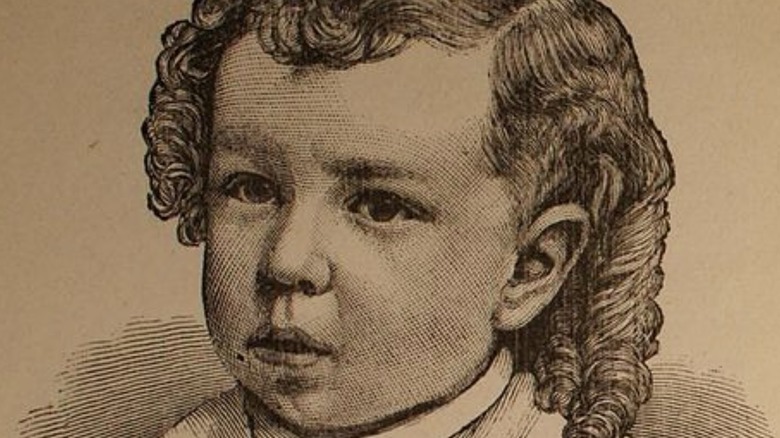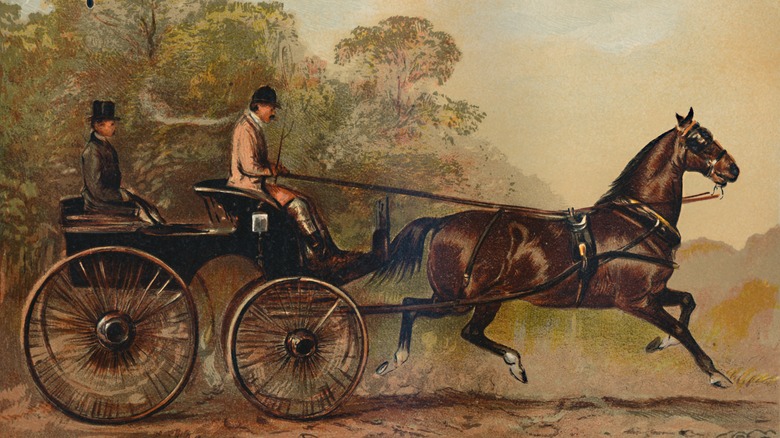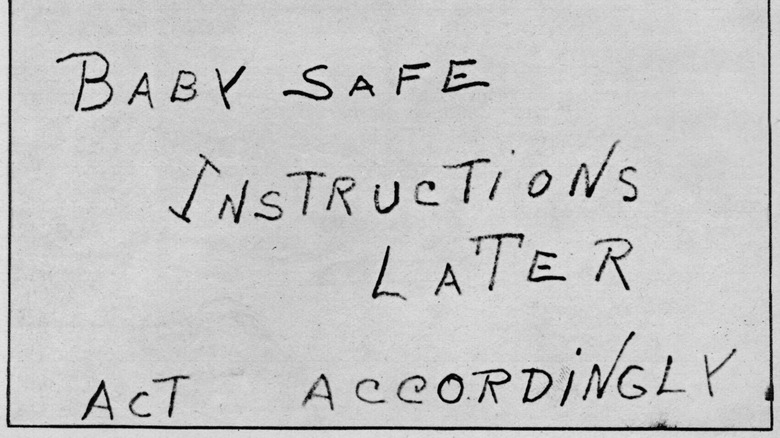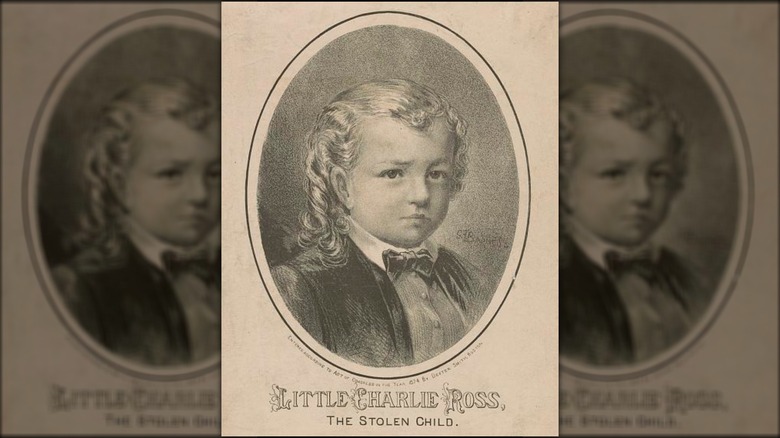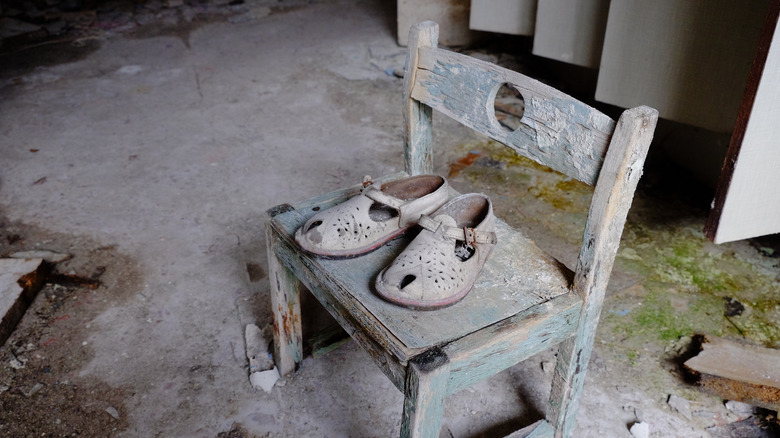The True Story Of Charley Ross' Kidnapping
These days, it is typically big news when a child goes missing. The parents of missing children are urged to report the disappearance immediately, and often the cases receive lots of media coverage, in part because getting the child's image and description to the public may help the authorities track down their whereabouts. Not only is reporting the disappearance as soon as possible the best way to increase the chances that a missing and possibly kidnapped child will be found, in some states it is actually a felony not to report a missing child within twenty-four hours of their disappearance, via the Crime Museum.
However, back in the 19th century, no real legal procedures or precedents had been established in cases involving missing children. In fact, missing children never even made it to the front page of any major newspapers – that is, until 1874, when a little boy named Charley Ross was taken right from the front yard of his family's Pennsylvania home. The shocking abduction and subsequent investigation made headlines across the nation, making the Ross disappearance the first nationally reported missing child's case in America, according to the Library of Congress Blog.
Charley's kidnappers gained his trust with the promise of fireworks and candy
Charley Brewster Ross was just 4 years old in 1874, living in Germantown, a well-to-do neighborhood in Philadelphia, with his mother and father, who worked as a dry-goods merchant. One day in late June of that year, Charley and his 6-year-old brother, Walter, were passing the time playing outside in their front yard when they made the acquaintance of two men passing by in a horse and buggy.
The two mysterious men took their time developing a relationship with the boys, spending around four days befriending Charley and Walter, earning their trust by chatting with them and giving them candy, according to the Library of Congress Blog. Then, on July 1, 1874, the unidentified men made their move, offering to drive the boys to the store to purchase fireworks and candy in anticipation of the upcoming July 4th celebrations. The boys agreed, climbing into the wagon of their own accord. The men then drove to a nearby shop where they handed Walter 25 cents to purchase the fireworks. Walter happily jumped out of the cart, and while he was inside, the two men drove off, abandoning Walter at the store and escaping with Charley, via the Pittsburgh Post-Gazette.
The kidnappers mistakenly believed the Rosses were well-off
Just three days later, on July 4, Charley's father, Christian Ross, received the first ransom letter from the kidnappers. It read: "Mr. Ros: be not uneasy you son charley bruster be all writ we got him and no powers on earth can deliver out of our hand," the letter read, according to PA Book.
The kidnappers sent a total of 23 handwritten ransom letters to Christian Ross through the post office system. The letters demanded $20,000 in exchange for the safe return of little Charley. However, Christian was unable to meet their financial demands. The kidnappers likely believed that, due to the size of their home and the relatively well-off neighborhood they lived in, the Rosses were a wealthy family who would easily be able to pay the desired sum to get their son back safely. However, they did not realize that Christian Ross had lost most of his money in the stock market crash of 1873, and was therefore unable to pay the ransom.
A burglar confessed to being involved with the kidnapping on his deathbed
Instead, Ross got the police involved. The sensational story quickly made national news, and thanks to the extensive media coverage, soon the whole country was looking for Charley Ross. Over 700,000 circulars were distributed bearing Charley's image, and in the first year, over 600 supposed sightings of the boy were reported, according to PBS. However, not a single one proved to be authentic. No real developments were made in the case until December of 1874, when the police were involved in a shoot-out with two burgarlers in Brooklyn, New York.
Joseph Douglas and William Mosher were both fatally shot while breaking into a home in Bay Ridge. Mosher was killed instantly, but it took two hours for Douglas to succumb to his wounds. As he was bleeding out, he made a shocking confession: They were the ones responsible for abducting Charley.
"It's no use lying now. Mosher and I stole Charley Ross," Douglas allegedly told the police, according to People. However, this deathbed confession still did not solve the mystery of what happened to Charley. Douglas claimed that Mosher, who was already dead, was the only person who knew the whereabouts of the child, and with the two men involved now deceased, the police had no leads left.
Christian Ross died without finding out what happened to his son
Following the Douglas confession, police went after Mosher's brother-in-law, William Westervelt. While they believed he was also involved in the kidnapping of Charley Ross, the jury was not convinced due to a lack of evidence tying him to the crime. He was found guilty of conspiracy and sentenced to six years in prison, but the trial produced no new clues about Charley's current location, according to the Library of Congress Blog.
Despite the many dead ends, the Ross family never stopped searching for their missing child. In total, the family spent over $60,000 to try to find Charley over the course of their lives. In 1876, Christian Ross even published a book about the ordeal, entitled "The father's story of Charley Ross, the kidnapped child." He reinvested all of the proceeds from the book's sale back into the search for his son, only to keep turning up empty-handed. Christian Ross died in 1897 without ever finding the answers he wanted, although Walter and other family members continued to receive messages from men claiming to be his long-lost brother well into middle age.
An Arizona court ruled that a 69-year-old carpenter was really Charley Ross
In 1939, a carpenter named Gustave Blair came forward claiming to be the real Charley Ross. He told authorities that his earliest childhood memories involved being hidden away in a cave, and alleged he had even been told as a child that his parents were not his real parents, and that he had been the victim of a kidnapping, according to the Library of Congress Blog. Sixty years after the initial kidnapping, the case went to trial, and following just eight minutes of deliberation, the jury delivered a verdict in Blair's favor (via the Evening Star). The Maricopa County Superior Court legally determined that Blair's true identity was Charley Ross.
However, the Ross family did not agree with the ruling. Although Blair made attempts to contact the Ross family and even legally changed his name to "Charley Ross," they never accepted his claim that he was really their missing relative. "I have been ignored by Walter and other members of my family despite the fact that they know my claims were justified. My wife and I sacrificed our home and in some instances have gone hungry to prove my birthright," he told the Evening Star in 1939. However, the family insisted that Blair was just another one of many imposters, and to this day, the true mystery of what really happened to Charley Ross has never been definitively solved.
